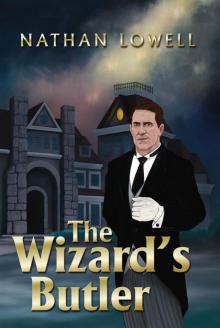- Home
- Nathan Lowell
The Wizard's Butler Page 4
The Wizard's Butler Read online
Page 4
He stared at the tray. “What else? What else?” He considered the coffee. How did the old man take it? Looking around again, he opened a cupboard beside the fridge. It contained a variety of serving dishes including those little cream pitchers they use in restaurants and some small dishes with notched covers. He took one of each, filling the little pitcher with milk—sorry, boss, no cream in stock—and placing it near the coffee on the tray. He found bulk sugar next to the bulk flour and filled the dish about half full. A silverware drawer held more silver than he’d seen outside of the mess hall. He picked a small spoon for the sugar bowl, a regular teaspoon to stir with, then grabbed a cloth napkin as he walked by. He stopped and looked at the napkin. It puzzled him but he shrugged, channeling his inner Jeeves. He arranged the accoutrements on the tray and stood back to survey his handiwork.
“What’s missing?” he asked.
On a hunch he went to the back door and surveyed the tarmac again. It took him a minute to spot it, but finally saw a telltale green plastic tube beside a rather large post-box at the end of the drive. He found the day’s paper rolled up inside. “At least I don’t have to track it down in the bushes.”
As he made his way back up the drive, he spotted a bright yellow flower beside the walk and plucked it, stripping the leaves from the lower stem and leaving a bit of green at the top. A narrow vase practically leaped from the cupboard beside the fridge and he pondered why the vase would be with the serving dishes for only a moment before garnishing the tray with paper and flower. He smiled. Not bad for the first time. He took the tray by the handles and carried it up the stairs, pausing at the library door for a moment until it opened.
“Thank you, sir. I was just wondering how I’d open it without dropping.”
Shackleford smiled up from the book in his lap. “Thank you, Perkins. Just leave it on the table.” He nodded at the library table at his side.
“Yes, sir. I hope this is satisfactory. I don’t know how you like your coffee.”
“After all these years, Perkins? Is your mind going?” Shackleford’s head tilted. “That’s not right.” He looked at Roger. “You’re not Perkins.”
“No, sir.”
The old man nodded and sighed. “Mulligan?”
“Yes, sir.”
“Sorry, Mulligan.” He offered a sheepish shrug. “The mind. A strange and terrible organ.”
“Comes with age, I believe, sir.”
His eyes blazed for a moment as he turned from his bagel to stare at Roger. “It’s not age. This is not age.” He bit each word off. Pushed them at Roger like weapons—verbal daggers, glinting in the morning sun.
“Of course, sir. Sorry, sir.” Roger felt foolish and rather bad that he’d insulted, perhaps even hurt the old man. “Will there be anything else, sir?”
Shackleford assaulted one of the bagels, tearing a bite out of it before pouring a splash of milk and scooping two tiny spoons of sugar into his coffee. A quick stir with the spoon and he slurped a sip, washing the bagel down before speaking. “Not at the moment.” He paused and looked up. “Mulligan. No, get your uniforms squared away. Come see me when you return.”
Roger gave what he began to think of as his Jeeves bow and left the room, pausing and then pulling the door closed behind him.
* * *
The Uber driver peered out at the street numbers as he navigated the tree-lined lane. Two- and three-story brick buildings lined the narrow street. Roger keyed a tip and leaned against the window to look up at the majestic old-city architecture. The States had nothing that could compare to the ancient construction in Europe and the Middle East, but these represented some of the oldest buildings on this side of the Atlantic. In a neighborhood of old residences, Roger began to worry that the old man had slipped him the wrong card after all.
“Here ya go,” the driver said, nodding at a building across the street.
Roger pressed the button to pay the man. “Thanks.”
“Welcome. Have a good day.”
He stepped out into the shade of one of the trees and the Uber motored off. He looked up at the two-story across the road. The number gleamed in shiny brass beside the door, but it looked like somebody’s grandmother lived there. Lace curtains adorned the bay window on the ground floor. A bushy philodendron hung in the middle, long tendrils cascading out of sight. A tree blocked his view of the upper story.
Roger crossed the street and pressed the bell, checking first to see if it was really a button and not a pull. The jingling sound tinkled inside and a twenty-something young man wearing a hip-length bathrobe over some black pants answered. It took Roger a moment to recognize the robe as a smoking jacket. The floofy neckerchief made the guy look like a Hefner-bee. “Yes?” he asked.
“Mrs. Pettigrew?” Roger asked.
The man nodded and stepped back, pulling the door open to allow Roger to enter. He pointed up the stairwell. “Top of the stairs.” The faint fug of actual tobacco clung to him, the sharp aroma taking Roger back to “smoke ’em if you got ’em” days. He’d have expected a different smoke, just going on the guy’s looks, but books and covers, yadda yadda.
Roger climbed the narrow staircase and stopped on the landing. He rapped three times with a knuckle on the closed door.
“Just a minute.” The voice gave it a sing-song cadence in a mid-alto range that made Roger grin. A chain lock rattled and the door swung wide to reveal a woman—somewhere between forty and sixty—in a smart business suit, single-breasted blazer over a sixties-era pleated skirt, both in a chocolate brown. A cream-colored blouse with a puff of lace at the throat and a pair of low-heeled shoes rounded out her outfit. A yellow cloth tape measure dangled in her free hand and a pencil stuck out of her graying hair. She gave him a quick up-and-down look. “Mulligan?” she asked.
“Yes, ma’am.”
She stepped out of the doorway. “Come in.” She pointed at a wooden box in the middle of the floor in an otherwise completely empty room. The bay window on this floor stood empty, the view across the street obscured by the leaves on the trees. “Stand there, please, Mr. Mulligan.”
He walked into the naked apartment and stepped onto the box.
She walked around him twice, measuring him with her gaze before starting to work with the tape. She made little “huh” sounds with each measurement. Very thorough, starting at his foot and working up his leg, calf, each thigh, and stretching the tape down both left and right inseams, her warm hand close to his crotch making him look down. “Straight ahead, if you please, Mr. Mulligan.”
She worked up his body—hips, waist. “Arms out, please.” Chest, fingertip-to-fingertip, shoulders, cuffs, neck. “You can put them down.” Apparently satisfied, she stepped back and looked him up and down again. “You’re Shackleford’s new man?”
“Yes, ma’am.”
“You know his last man passed away in the spring.”
“Perkins, ma’am?”
“You knew him?”
“No, ma’am.”
A faint smile twitched her lips. “He called you Perkins?”
“Easy enough to do. Habits, ma’am.”
She nodded, as if making up her mind. “You’ll do.” She walked behind him and he looked over his shoulder to see her opening a wardrobe tucked against the back wall, one he could have sworn wasn’t there before. She pulled out a white shirt and a pair of slate gray pants. She turned to him, shirt hanging from two fingers of one hand and the trousers over her other forearm. She huffed. “Strip to your boxers, Mr. Mulligan. We’ve work to do.”
For a moment he wondered how she knew he wore boxers but stripped down. Wasn’t the first time he’d been ordered out of his clothes. At least this time he didn’t have to be nuts-to-butts with some hairy grunt in front of him. She took his garments and hung them in the wardrobe before crouching in front of him, holding the pants. It felt only slightly awkward but he stepped into them, allowing her to dress him—pulling the waistband up his legs and fastening the two buttons at the top.
She went behind him with the shirt and lifted it up so it hung from his shoulders.
“Button up, tuck it in, Mr. Mulligan.”
He settled the shirt and ran the buttons up the front and on his cuffs before opening the front of his trousers again to settle the tails. “These fit pretty good.”
She snorted. “They should.” She came around him, pulling here, tugging there. She pulled his arms down to his sides and checked the cuffs. “Good.” She returned to the wardrobe, emerging with a dove gray tie and black vest. She held the tie out to him. “I trust you know what to do with this?”
He took it and tied a passable Shelby without a mirror, the tail falling just shy of his waistband. He shrugged. “Near as I can do by touch.”
She nodded lifting the front to check the trailing end. “Passable. Full Windsor?”
He pulled the knot out, adjusted the lay, and ran as much of a full Windsor as he could without seeing where his fingers were going.
“Keep it a little looser in the knot until it’s ready to set,” she said.
His fingers followed her instructions without Roger having to think about it. Again, the tie fell correctly against his waist but the knot felt a little bulkier.
“Yes. You’ve got the shoulders for a full Windsor and the tie’s long enough to support the knot.” She handed him the vest. “This is a waistcoat, not a vest. You think it’s a vest. You’re wrong.” She held it behind him to slip on. He put his arms back and she came around the front to settle and button it. “Leave the bottom button undone. You’ll want to button it. Military types always do, but this is your working uniform and it’s not supposed to be buttoned.”
“Yes, ma’am.”
She brushed the waistcoat down, smoothing it over his stomach. She nodded and returned to the wardrobe, emerging with a black jacket. She held it for him to slip on and pulled it up over his shoulders. He shot his cuffs and buttoned the top button, feeling the jacket settle around him like armor. She tugged the back hem down and walked around, looking at the drape. “Very nice. This is your normal working uniform.” She looked down. “Oh, one moment.” She went back to the wardrobe and pulled out a pair of black socks and black oxfords with a simple toe-cap. “These. Put them on, please, Mr. Mulligan.”
He sat on the box and put on the socks and shoes before resuming his position on the pedestal.
“Yes. Very good,” Mrs. Pettigrew said, walking around him. “As I was saying, this is your normal working uniform. When in the kitchen or engaged in any activity where the jacket may be an obstacle or become soiled, you replace the jacket with an apron. Any questions, Mr. Mulligan?”
“No, ma’am.”
“You’ll find living and working in a jacket and tie becomes no more of a burden than your army fatigues in time. I emphasize that it takes some getting used to for most Americans, but you will adjust.” She paused and nodded again. “Slip the jacket off, please.”
He released the button and she pulled the garment down his arms, returning it to the wardrobe. When she came back, she carried a tailed coat in black. She held it for him to put his arms in and slid it up his back. He tugged it around and buttoned the top button again, checking his cuffs. She walked around him and he stood for her inspection, staring straight ahead. “Yes. This is for formal wear. If Mr. Shackleford needs you to officiate at a formal dinner or professional evening gathering, this is the coat you wear with the dress trousers. They’ll have a satin ribbon on them.” She reached into the wardrobe once more and pulled out a pair of white cloth gloves. She handed them to him with a smile. “I believe you know what these are?”
He took them and pulled them on, settling them on his fingers and tugging the cuffs to lay against his wrists.
“The gloves go with this coat. They are only for formal occasions unless Mr. Shackleford explicitly requests them.” She gave him a stern look. “Do not put them—or anything else—in the outside pockets of the coat or the trousers. Am I clear?”
“Yes, ma’am.” He paused. “How do I carry things?”
“What do you mean, ‘things?’”
“My wallet, identification? Keys?”
She nodded. “You may place your identification in the inside left breast pocket. A card. One. Americans tend to like having their drivers’ licenses, but this is largely optional since you’re seldom asked to prove your identity in the house, nor do you wear this uniform when off-duty and off-premises.” She reached under the right-hand side of his coat, tugging at a loop in his waistband. “You may hang a set of keys here if you must. Generally it’s not required in the course of your normal duties unless you’re responsible for a large house with a great deal of security.” She looked up at him. “This is your first posting?”
“Yes, ma’am.”
Her stern visage softened slightly. “Shackleford House is a good place to start your career. You’re mature enough to understand the duties and young enough to grow into them. Mr. Shackleford has always been a kind and generous employer.”
He didn’t tell her it was only for a year. “Yes, ma’am.”
She held her hand. “Coat, please?”
He slipped it off and handed it to her. She hung it up and came back around in front of him. She held out a gold chain with an ornate gold watch attached. “Your wrist watch is not worn when you wear a waistcoat, Mr. Mulligan. Do you know how to wear this?”
He took the watch from her, slipped the T-bar top through a buttonhole in the waistcoat and slipped the watch into the left pocket. He raised his eyebrows in her direction.
She nodded. “What time is it, Mr. Mulligan?”
He reached across and withdrew the watch from the pocket, and pressed the stem to open the cover. “Nearly noon, ma’am.”
“Thank you, Mr. Mulligan,” she said. “Do you have any questions?”
He closed the watch and replaced it. “No, ma’am.”
“Excellent. If you’d don your street clothes again, I believe we’re almost done.”
As he took off each garment she put it in the wardrobe. When everything was replaced, she handed his own clothes back to him. He placed his foot on the box to tie his shoes. Straightening, he turned to find Mrs. Pettigrew standing by the door with a book in her hands.
“Some last words of advice, Mr. Mulligan,” she said. “Get a notebook. Small three by five. Black. Invest in a good pen, silver. Those you may—in fact, should—keep on your person at all times. The inside breast pocket on either style of jacket. In the beginning, in particular, you’ll want to write things down. Until you get the rhythm of the house and the flow of your duties, you will find yourself overwhelmed. Keeping notes as you go will help you organize your thinking.”
She reminded him a little of his boot camp instructors. “Thank you, Mrs. Pettigrew. I will.”
“Since this is your first posting, I would like you to take this.” She held the book out to him. “The Shackleford House Butler’s Bible. Anything you need to know about managing Shackleford House is described in there. This volume is specific to Shackleford House, so if you change positions, you’ll need to come back to see me. Depending on where you go, there may be different requirements.”
He felt his eyebrows rise as he took the leather-bound volume. The weight of it surprised him and the idea of a book outlining the duties of a specific house made his head spin. What kind of money and time went into making a unique item like that? “Thank you, Mrs. Pettigrew. I don’t know what else to say.”
She offered her hand and he shook it with a small bow. “I’ll have your uniforms delivered shortly. Good day, Mr. Mulligan. Good luck.”
“Good day, Mrs. Pettigrew.”
Before he knew it, he was back on the sidewalk outside, blinking in the midday sun. He looked up at the building again, feeling like there was something he should remember. After a few moments he shrugged and pulled out his phone to summon an Uber. Judging from the weight of the book in his hand, he had a lot of reading to do. He’d feel more comfortable readin
g it in his quarters.
Chapter 3
Roger had the Uber drop him at the back of the house so he could pick up the mail on the way in. There seemed rather a lot of it, but he tucked his book under his arm and sorted out the trash from the treasures. Some pieces looked official, while others could be tossed in the bin. Probably. He looked up at the house, wondering if the old man was a coupon clipper. The idea made him snicker. He navigated the back door, remembering to throw the bolt, and made a mental note to get a notebook and silver pen so he could make an actual note to call a locksmith.
He walked through the kitchen to go to his quarters. After placing his Butler’s Bible on the bookcase, he pushed the rolltop up and went to drop the mail on the surface, but held off as he surveyed the contents of the desk. Placing the mail aside on the desk’s chair, Roger started exploring. Inside the rolltop were cubbies and small drawers. A elegantly shaped pen in an equally elegant stand stood to one side while on the other an antique stapler peeked out of a cubby. A bookshelf ran across the top holding a row of large, bound ledgers, each neatly labeled with dates.
“I didn’t realize I was the bookkeeper, too.” He kicked himself because neither he nor Vinnie had thought of it. He should have. He pulled the most current ledger from the shelf and opened it on the desk. It took him a few minutes to work out what was on the pages. The numbers and columns he understood at first glance, but it took him a moment to decipher the line items. Eventually he worked it out. The last entry was several weeks old.

 By Darkness Forged (Seeker's Tales from the Golden Age of the Solar Clipper Book 3)
By Darkness Forged (Seeker's Tales from the Golden Age of the Solar Clipper Book 3) The Wizard's Butler
The Wizard's Butler Cape Grace
Cape Grace By Darkness Forged
By Darkness Forged Quarter Share
Quarter Share Suicide Run (Smuggler's Tales From the Golden Age of the Solar Clipper Book 2)
Suicide Run (Smuggler's Tales From the Golden Age of the Solar Clipper Book 2) Home Run (Smuggler's Tales From the Golden Age of the Solar Clipper Book 3)
Home Run (Smuggler's Tales From the Golden Age of the Solar Clipper Book 3) To Fire Called (A Seeker's Tale From The Golden Age Of The Solar Clipper Book 2)
To Fire Called (A Seeker's Tale From The Golden Age Of The Solar Clipper Book 2) Home Run
Home Run Suicide Run
Suicide Run South Coast (Shaman's Tales From The Golden Age Of The Solar Clipper Book 1)
South Coast (Shaman's Tales From The Golden Age Of The Solar Clipper Book 1) Milk Run (Smuggler's Tales From The Golden Age Of The Solar Clipper Book 1)
Milk Run (Smuggler's Tales From The Golden Age Of The Solar Clipper Book 1) Ravenwood (Tanyth Fairport Adventures)
Ravenwood (Tanyth Fairport Adventures) Captain's Share (Trader's Tales from the Golden Age of the Solar Clipper)
Captain's Share (Trader's Tales from the Golden Age of the Solar Clipper) Owner's Share (Trader's Tales from the Golden Age of the Solar Clipper)
Owner's Share (Trader's Tales from the Golden Age of the Solar Clipper) Half Share
Half Share The Hermit of Lammas Wood
The Hermit of Lammas Wood Ravenwood
Ravenwood Full Share
Full Share A Light In The Dark (Tales of the Deep Dark)
A Light In The Dark (Tales of the Deep Dark) In Ashes Born (A Seeker's Tale From The Golden Age Of The Solar Clipper Book 1)
In Ashes Born (A Seeker's Tale From The Golden Age Of The Solar Clipper Book 1) Double Share: Solar Clipper Trader Tales
Double Share: Solar Clipper Trader Tales Zypheria's Call (A Tanyth Fairport Adventure)
Zypheria's Call (A Tanyth Fairport Adventure) Quarter Share attftgaotsc-1
Quarter Share attftgaotsc-1